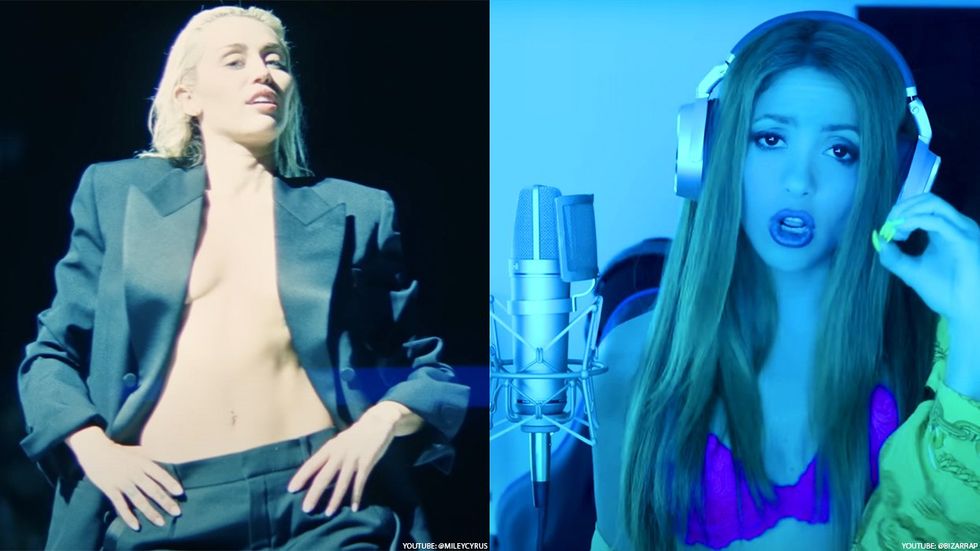Music
Why the Phenomenon of the 'Breakup Song' Is Absolutely Gay Rights
Why the Phenomenon of the 'Breakup Song' Is Absolutely Gay Rights

By continuing to use our site, you agree to our Private Policy and Terms of Use.
Why the Phenomenon of the 'Breakup Song' Is Absolutely Gay Rights

Whenever Robyn's "Dancing on My Own" blasts inside a gay nightclub in New York, I throw myself into the center of the dance floor amid a crowd of tipsy strangers. My body and soul dance to the rhythm of every lyric; it's my anthem of joy, perhaps, revenge against any man who has ever dared to stop loving me.
The "breakup song" is my favorite genre of music. It channels many elements of queerness: weaponizing pain and rejection as an opportunity for rebirth and becoming stronger and carefree after unexpected betrayal. After all, the LGBTQ+ community has had to learn to laugh in the face of adversity or risk never smiling.
The current renaissance of breakup music (Hi, Miley and Shakira!) emboldens us once again to wave our middle fingers at the disappointments of love and relationships, even if a date or partner stands behind us. It's really a moment we need to experience alone.
In Miley Cyrus's "Flowers," she flips the script on a song her ex Liam Hemsworth had reportedly dedicated to her (Bruno Mars's "When I Was Your Man"), accompanied by an Easter-egg-filled music video that made the Internet shit itself. Shakira is less coy in her collaboration with Argentine producer Bizarrap, "BZRP Music Sessions #53," and she basically tells her ex Girard Piqué to go f**k himself in Spanish.
Coincidentally released in the same week, the songs charted at number 1 and number 9 on Billboard, respectively. Miley broke the record for the most streamed Spotify song in one week, and Shakira for the most watched Latin music video on YouTube in one day. Clearly, when executed well and authentically, the phenomenon of the breakup song captivates listeners across the board; I don't care who you are.
But despite artists expressing the melting pot of emotions that follows up a breakup in myriad ways, singer-songwriter Joy Oladokun says her favorite breakup songs open a window to the connection between anger and sadness.
"What makes a great breakup song is whatever was going on with Fleetwood Mac always: love, pride, tension, anger, vulnerability," she says, "All my favorites (‘Go Your Own Way,' ‘I Can't Make You Love Me,’ ‘Someone Like You’) acknowledge that having your heart broken pisses you off as much as it makes you cry. But they also aspire to make something new out of the wreckage, a theme that often comes up in my work and life."
Oladokun is not wrong; these artists are turning their respective wreckages into millions of dollars. Shakira sings the iconic truth, “las mujeres ya no lloran, las mujeres facturan.” Artists cashing in their exes with shameless — if not joyfully arrogant — breakup empowerment is hardly new. Though this music category is not to be confused with songs about heartbreak, it very much embodies broken hearts. But electrifying magic is in how they become whole and the powerful independent beings that remain. Like a phoenix rising, it leaves behind the ashes of unworthy love.
Pop singer-songwriter Bronze Avery says everyone handles a breakup in a way that makes the most sense to them, but it’s important for breakup songs to be honest about the pain yet laced with strength. His favorites are "You're Not the One" by Sky Ferreira, "I Hate U" by SZA, "I Don't Want You" by Raye and Riton, and his own released breakup anthem, "Over (And Over)." It's important for him to feel empowered and victorious by the track's end.
"As queer people, we've been conditioned to cope with our pain in ways that are unique to us," Bronze Avery says, "and that includes crying on the dance floor. So breakup songs channeled through dance music have been a consistent through line in queer history, and it seems like that's not coming to an end anytime soon."
Singer-songwriter Izzy Heltai says in queer spaces, chosen family is just as romantic and just as important, but perhaps not as typical as binary relationships; love in all its forms is felt so much more profound because it's not taken for granted.
Even romantic relationships tend to materialize differently —- liberated from the status quo, which explains the universal relatability of breakup songs. Whether you're in a polyamorous relationship, a throuple, or a monogamous hetero marriage, the pain of losing a relationship you held close to your heart is felt with the same conviction.
"Songs like 'Picture to Burn,' the OG Taylor albums which pioneered breakup songs" are his go-to soundtrack, Izzy Heltai says. "It's always like, OK, you did this thing, now let me show you what I can do, which I feel a lot in my life. In my childhood, I was a kid who was told they couldn't do anything, so there's always an element [in breakup songs] of let me prove these people wrong."
Undoubtedly, there's a whole mood of "look at me now" in the most purposeful breakup music. (I've executed this by sleeping with ex-lovers years later, but only once with all my effort, and then ghosting.) But queer people have carried this vendetta since their youth. When you spend a lifetime trying to fit in a box, you will want an audience when the proverbial "Jack" is finally freed.
And isn't that the ultimate revenge most of us dream about as closeted teenagers? For every bully who made us feel small to bear witness to our unencumbered adult grandiosity. That's the art of the breakup song; it rekindles emotions of feeling less and uses them to reach a point of uncompromising glamour. We're only getting better and happier, whether you like it or not.